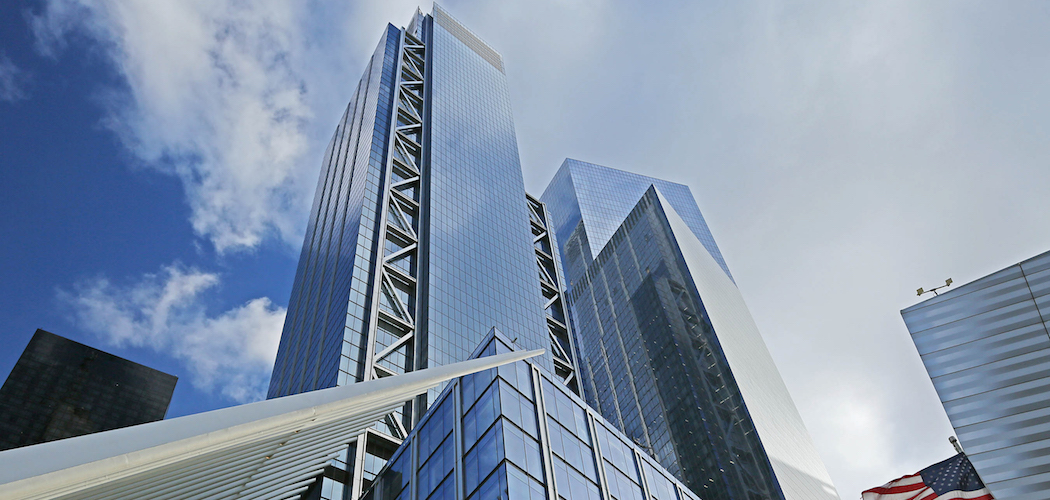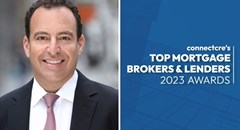By Andrew Coen | Commercial Observer
Criss-crossing the country as a child between the East and West coasts prepared Silverstein Properties’ Michael May well for a life in the commercial real estate industry and, more recently, for his firm’s big push into newer markets.
May is president of the firm’s lending arm, Silverstein Capital Partners (SCP). Growing up, he lived in both the San Francisco and Washington, D.C., areas, and traveled often with his father, a criminal attorney, on business trips to Seattle and San Diego. They vacationed in such locations as Maine, Massachusetts and South Florida.
“There was a lot of time spent traveling when I was a kid, and I think that, in some ways, impacted how I looked at life,” said May, whose tenure at SCP began in September 2018, after eight years working as co-founder and chief operating officer at Cantor Commercial Real Estate (CCRE). “I’ve never been tied down to one place or one city.”
May’s career journey has also included many stops along the way, starting with seven years in the real estate consulting group at Arthur Anderson, where he worked on transactions in the U.S., Western Europe, Russia and Latin America. The University of Maryland alumnus then joined General Electric Capital Corp., focusing on the acquisition of subordinated commercial mortgage-backed securities (CMBS), before joining Credit Suisse as a managing director in 1997.
After a 12-year stint at Credit Suisse, May co-founded CCRE in 2010, and led the origination of more than $50 billion in CRE loans spanning 2,000 transactions across property types.
Since arriving at SCP, May has been instrumental in guiding Silverstein’s ongoing expansion to the West Coast. SCP made a $700 million construction loan to Fortress Development in April for its 1.1 million-square-foot, mixed-use project in Bellevue, Wash. Nearly a year earlier and not too far away, Silverstein Properties, led by Chairman Larry Silverstein, closed on a development site at 801 Blanchard Street in Downtown Seattle, near Amazon’s global headquarters.
May spoke to Commercial Observer in mid-June about what brought him to Silverstein, markets that the company is eyeing, and how he sees the commercial real estate space shaping up post-COVID.
Commercial Observer: What was your path to Silverstein?
Michael May: I left Credit Suisse in 2009, after the great financial crisis. We thought about running an off-balance sheet, private equity-style model there, but found that — just from a cost perspective — it was a very, very high-cost environment. We had a relationship with Cantor Fitzgerald, and a team of us left to go over there and start a business called CCRE. We raised our initial capital in 2010, and ran the lending business until it was sold into the Newmark [initial public offering] in 2017.
I had a period of time where I was on garden leave, and I was actually sitting in Ibiza [Spain] with Roger Silverstein, Larry’s son, who is a friend of mine. I got a call from [Silverstein Properties CEO Marty Burger], saying that they were interested in starting a debt platform and would I consider coming on board to work with them. I was looking for a company that had people all rowing in the same direction with integrity, a great brand, well capitalized, and a place I could work at with friends for the rest of my career. It checked all the boxes.
Talk about your recent deals in Washington state and the significance of those transactions.
We really like the Seattle market. It’s got incredibly strong growth and a huge number of tech companies, which are growing and highly valuable. Silverstein closed on a project in Downtown Seattle called 801 Blanchard Street, and we looked across the [Puget] Sound at the Bellevue market to bid on some other projects and thought that the growth factors there were just absolutely spectacular. When we looked at things like employment growth, strong salaries and wages, highly educated workforce, and then barriers to entry and being really scarce in the new development, we thought that this is just kind of a perfect storm of positive factors.
One of the things that differentiates us on the capital side is we have extremely deep pockets and we can do highly levered, highly structured deals. We can also work with the Silverstein development team to understand highly complicated construction projects.
The project that we did in Bellevue has multiple components: It’s got retail, parking, hotel, condos, a couple of levels of condo product. It’s an $800-plus-million-dollar project, and it required a significant amount of capital with really heavy structure. We were able to accomplish all that, and it’s something that gives us a competitive advantage — doing first mortgage loans at that high level, where [other] people need to go in and put together a syndicate, or put together senior and mezzanine financing. We found a project we loved in a market we loved, and it really fit into our competitive advantage.
What are your plans in terms of overall expansion?
We think the West Coast has some really, incredibly strong markets, again led by employment growth that’s led by tech candidates who love Santa Cruz, who think San Francisco is going to come back or believe in the major cities.
In L.A., we’ve got a huge investment, and we like things in Orange County and down the coast. Bellevue was a market that we’d love to do more in — we looked at the condo market there and it’s got less than two months of inventory. In all of Seattle, we looked at the hotel market and it’s been growing at double digits for the last 15 years, and now there’s almost no new supply that’s not leased every time a building comes out.
You hear these stories about tech never coming back to the office, but that’s absolutely not happening. I think there’s 6 million square feet of new development that’s all pre-leased by tech tenants in the Bellevue market. We’re selective in our opportunities — we don’t do 100 deals a year — we do a dozen in the markets that have strong growth and good demographics.
Which other markets are you eyeing?
We love Austin. We think that’s another market that’s seeing incredible employment growth, with really smart people coming out of [the University of Texas at Austin]. One of the other commonalities of these things is finding great state schools, or other schools putting out engineers and tech workers. We’re finding places that have low taxes are driving demand. So, Seattle and Texas certainly share that commonality.
Other parts of Texas we think are great, and Denver is certainly a market we like. We like to move in scale. Nashville’s not quite as big, in terms of some of the size of the deals, but to the extent we find something there. Same thing in Raleigh-Durham: There’s a bunch of great schools, technology and biotech. We’re also bidding on a project in Boston right now. So, we’re looking at major markets driven by tech, biotech and life sciences.
How would you describe the transactions that you’re working on today, in comparison to a year ago?
A year ago, we were doing primarily mezzanine loans and we were doing structured deals. I think, over the past year, we were able to do many more, just one-stop-shop transactions, because capital was scarce. It was hard to have certainty of execution over the past 15 to 17 months.
We were able to buy a bunch of loans during COVID — not necessarily distressed loans, but for more distressed sellers, people that need liquidity — and so, we got really strong projects with pricing that we thought was really attractive. I think that trend has gone away and we’re seeing a lot more liquidity over the past 90 days.
The biggest thing that we’re doing now is we found that people want to do one-stop shopping. I don’t know who else has written a $700 million, mixed-use construction loan over the last year besides us. I think there have been some industrial loans that size, but the ability to move in that scale and that size, there just aren’t a lot of other people that can do it, so that’s the biggest difference.
I think we’ll get back into doing more straight mezzanine loans, as the market feels more comfortable putting together syndicates, and believing that everyone in the syndicates is actually going to show up and close.
Where do you see the need for rescue capital today?
Rescue capital is interesting. I’d say, over COVID, there was a real push to do preferred equity on hotel products, and it was really to prop up hotel companies in their entirety and keep them from being insolvent. The banks kind of kicked the can for a period of six months to a year, but that’s coming to an end.
Hotels that rely on corporate business are going to take the longest time to come back, but there was a lot of capital that fell into that space because the returns were really strong. I’m hearing from borrowers and friends of mine in the hotel leisure business that the market is incredibly strong. We looked at some projects in the Caribbean that have been 100 percent booked for the last few months that are outperforming their best years ever, so I think that spot where you might have thought you’d see distress isn’t there.
In terms of places that are distressed, where we’ve looked, I mean, there’s kind of a have and have-nots of condo inventory loans or condo development projects. There’s a bunch where people expected really high pricing, and then the world changed — and the extra year of developing, and perhaps the project stalling, has caused their costs to go up, while the pricing came down. And that’s a tough combination, because there’s need — especially in some big condo projects in New York — for the rescue capital where they were lately capitalized.
I think there’s some places in the condo space, maybe the office space, where people just got really highly levered or put together capital stacks that had foreign and other buyers that weren’t able to perform, so that requires rescue. And then, I think there are a handful of what I would call B-quality office buildings that I think are going to take longer to backfill.
I think in the Financial District, there are some buildings that have just huge blocks of space. And I think you are going to see numerous buildings half-empty, three-quarters empty for the next three to five years, and they’re going to need a ton of capital. I’m not sure if that’s rescue capital yet, depending on sponsorship, but I see massive needs for capital in some of these buildings.
Generally, how do you see the office sector shaping up, given the remote-working trends that have been accelerated during the past year?
I remember, 30 years ago, [hearing chatter] that people weren’t going to come into cities and build offices anymore at the beginning of the internet.
We have been back in the office since Labor Day. The companies you think would be least likely to come back to the office are the ones signing the biggest leases. So, we feel really bullish about offices. You’re going to see what happens whenever there’s a cycle, which is, you’re going to see people taking the opportunity to cut leases or they’re going to move from maybe a B-plus building to an A building.
So, the better buildings will do better. The better buildings have the better air quality systems, they have the better technology, they have the things that people want in terms of feeling comfortable in the workplace.
What about suburban office demand (which has picked up a bit in the past year)? Do you see that demand continuing post-pandemic?
I’ll start by saying I’m a little jaded here, because we just don’t do the low-rise office buildings as part of our portfolio. In general, I’ve never worked on a lot of suburban office deals. There are low barriers to entry in most markets. A lot of it’s old; there’s a huge amount of supply.
I think there’s clearly going to be some people that want to stay in the suburbs and people have moved out to the suburbs; I think it’s going to have a pop to it. But I think, ultimately, it’s going to end up in the same spot that it was in before, which is [that] some markets are good, some are bad.
I’m not bullish on huge growth in suburban offices, with the exception of some of the markets that are just more suburban in nature — the tech markets, where the low office is the high-rise of that neighborhood.
How do you see the retail sector shaping up going forward, given the increase in e-commerce and online shopping?
We’re seeing retailers coming back to markets that are attractive markets and signing leases, because they think they’re getting good deals. You can look at Madison Avenue or SoHo and see just massive drops in pricing. And so, we’re seeing retailers coming in, and signing leases and kicking the tires, and a lot of activity in good spots and good retail.
There’s a reason people go shopping — because they enjoy it. I can’t think of anyone who’s dying to go to the store to pick up batteries or a flashlight, or a toothbrush, but people do like to go try on clothes and do other stuff — look at furniture and sit in the chair. So, I think the retailers that are good retailers that have made it through, I think, are going to expand and are going to take space.
We’re seeing a lot of activity in the market on storefronts, which is very encouraging. It all comes back to people coming back to the city. In apartment portfolios, we’re seeing huge surges.


